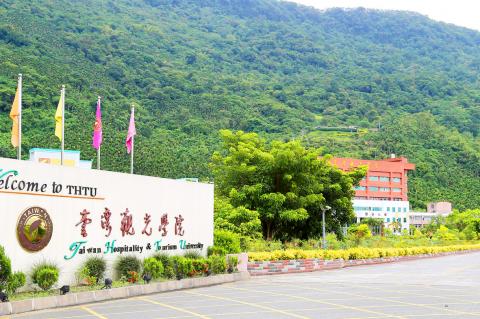A total of 198 university and college departments failed to recruit any students in the 2017 to 2018 academic year, up from 151 last year, a report published by the Ministry of Education said yesterday.
The report found that 198 majors of the 8,849 offered in vocational, bachelors, masters and doctorate programs did not attract any students for the academic year.
The trend is not limited to average or lower-ranking universities.

Photo: CNA
A few doctorate programs at some of the nation’s top schools, including National Taiwan University, National Tsing Hua University, National Chiao Tung University, National Cheng Kung University and National Chengchi University, were unable to attract students, despite many of these elite schools having undergraduate enrollment rates of 90 percent or more, the report said.
Excluding colleges of religious studies, 17 had a new student registration rate of less than 60 percent, the report said.
Taiwan Hospitality and Tourism University (THTU) in Hualien County had the lowest new student registration rate at 29.87 percent, it said.
Since 2013, THTU has been listed as a so-called “school under ad hoc consultation” by the ministry and its recruitment has been poor for a long time, Department of Technological and Vocational Education Director Yang Yu-hui (楊玉惠) said in September.
This year, THTU recruited 74 students, or a recruitment rate of about 40 percent, Yang said.
Nan Jeon University of Science and Technology in Tainan had the nation’s second-lowest new student registration rate at 32.17 percent, the ministry said.
Last year, then-Nan Jeon president Huang Tsung-liang (黃聰亮) was indicted by the Tainan District Prosecutors’ Office for allegedly selling fake academic degrees.
Nan Jeon has also been listed as a “school under ad hoc consultation” by the education ministry.
Other institutions that failed to reach a 60 percent new student registration rate included Huafan University, Hsuan Chuang University and Kainan University, the ministry said.
According to Article 55 of the Private School Act (私立學校法), private institutions with less than 3,000 students that have failed to reach a 60 percent new student registration rate for two consecutive years can be ordered to make improvements by a specified date and forced to undergo ad hoc consultations.
This is the first time the ministry has made student registration rates for universities and colleges public.
In November last year, at the request of the legislature’s Education and Culture Committee, Minister of Education Pan Wen-chung (潘文忠) promised to make registration rates public so prospective students would have more information in their decisionmaking.
Location is the biggest disadvantage facing universities trying to recruit students, Deputy Minister of Education Yao Leeh-ter (姚立德) said.
Students prefer to attend universities in urban areas, especially in the north of Taiwan, a trend that has become more obvious with Taiwan’s sub-replacement birthrate, Yao said.

A magnitude 7.0 earthquake struck off Yilan at 11:05pm yesterday, the Central Weather Administration (CWA) said. The epicenter was located at sea, about 32.3km east of Yilan County Hall, at a depth of 72.8km, CWA data showed There were no immediate reports of damage. The intensity of the quake, which gauges the actual effect of a seismic event, measured 4 in Yilan County area on Taiwan’s seven-tier intensity scale, the data showed. It measured 4 in other parts of eastern, northern and central Taiwan as well as Tainan, and 3 in Kaohsiung and Pingtung County, and 2 in Lienchiang and Penghu counties and 1

FOREIGN INTERFERENCE: Beijing would likely intensify public opinion warfare in next year’s local elections to prevent Lai from getting re-elected, the ‘Yomiuri Shimbun’ said Internal documents from a Chinese artificial intelligence (AI) company indicated that China has been using the technology to intervene in foreign elections, including propaganda targeting Taiwan’s local elections next year and presidential elections in 2028, a Japanese newspaper reported yesterday. The Institute of National Security of Vanderbilt University obtained nearly 400 pages of documents from GoLaxy, a company with ties to the Chinese government, and found evidence that it had apparently deployed sophisticated, AI-driven propaganda campaigns in Hong Kong and Taiwan to shape public opinion, the Yomiuri Shimbun reported. GoLaxy provides insights, situation analysis and public opinion-shaping technology by conducting network surveillance

‘POLITICAL GAME’: DPP lawmakers said the motion would not meet the legislative threshold needed, and accused the KMT and the TPP of trivializing the Constitution The Legislative Yuan yesterday approved a motion to initiate impeachment proceedings against President William Lai (賴清德), saying he had undermined Taiwan’s constitutional order and democracy. The motion was approved 61-50 by lawmakers from the main opposition Chinese Nationalist Party (KMT) and the smaller Taiwan People’s Party (TPP), who together hold a legislative majority. Under the motion, a roll call vote for impeachment would be held on May 19 next year, after various hearings are held and Lai is given the chance to defend himself. The move came after Lai on Monday last week did not promulgate an amendment passed by the legislature that

AFTERMATH: The Taipei City Government said it received 39 minor incident reports including gas leaks, water leaks and outages, and a damaged traffic signal A magnitude 7.0 earthquake struck off Taiwan’s northeastern coast late on Saturday, producing only two major aftershocks as of yesterday noon, the Central Weather Administration (CWA) said. The limited aftershocks contrast with last year’s major earthquake in Hualien County, as Saturday’s earthquake occurred at a greater depth in a subduction zone. Saturday’s earthquake struck at 11:05pm, with its hypocenter about 32.3km east of Yilan County Hall, at a depth of 72.8km. Shaking was felt in 17 administrative regions north of Tainan and in eastern Taiwan, reaching intensity level 4 on Taiwan’s seven-tier seismic scale, the CWA said. In Hualien, the